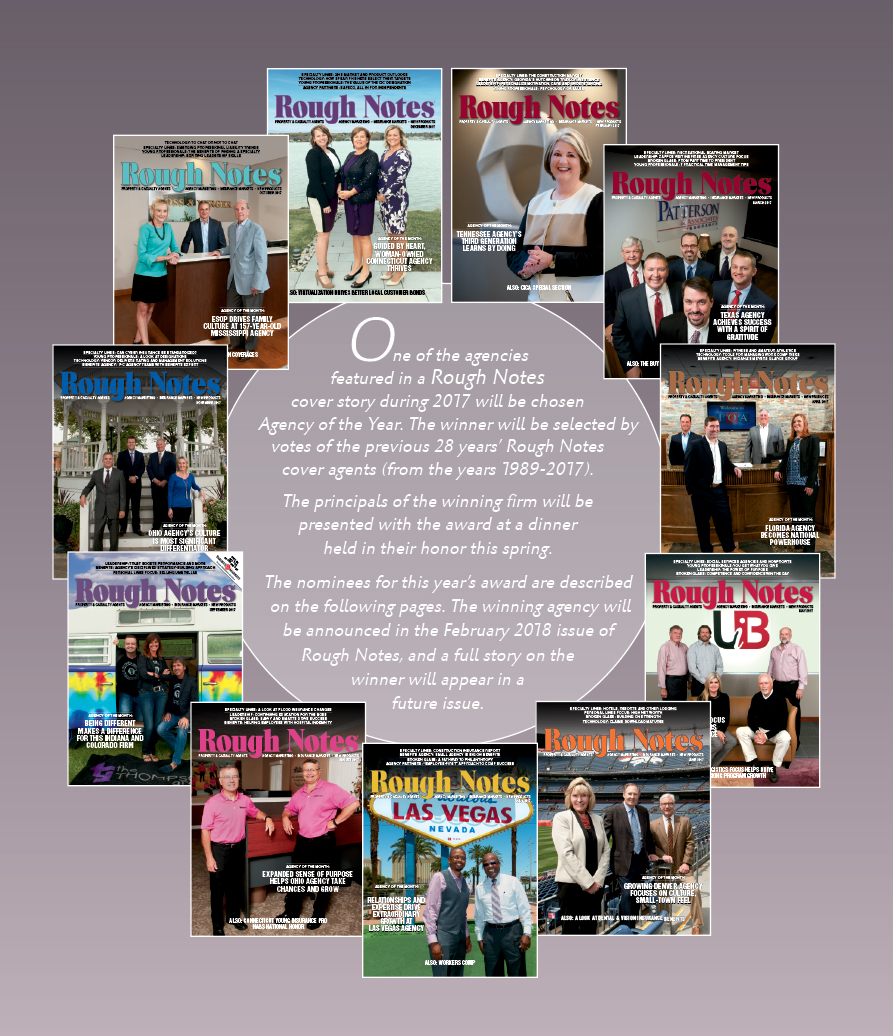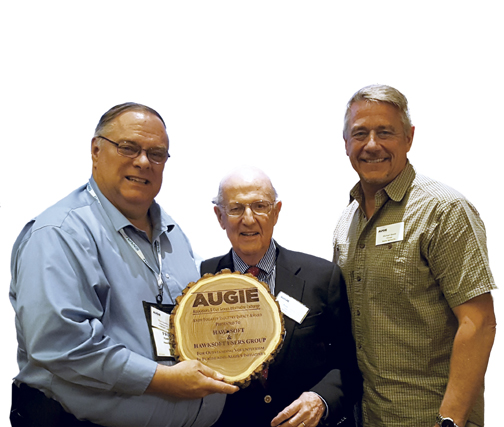TWENTY-NINTH ANNUAL
ROUGH NOTES
AGENCY OF THE YEAR CANDIDATES
Who will be the 2017 Agency of the Year?
One of the agencies featured in a Rough Notes cover story during 2017 will be chosen
Agency of the Year. The winner will be selected by votes of the previous 28 years’ Rough Notes cover agents (from the years 1989-2017). The principals of the winning firm will be presented with the award at a dinner held in their honor this spring.
The nominees for this year’s award are described on the following pages. The winning agency will be announced in the February 2018 issue of Rough Notes, and a full story on the winner will appear in a future issue.
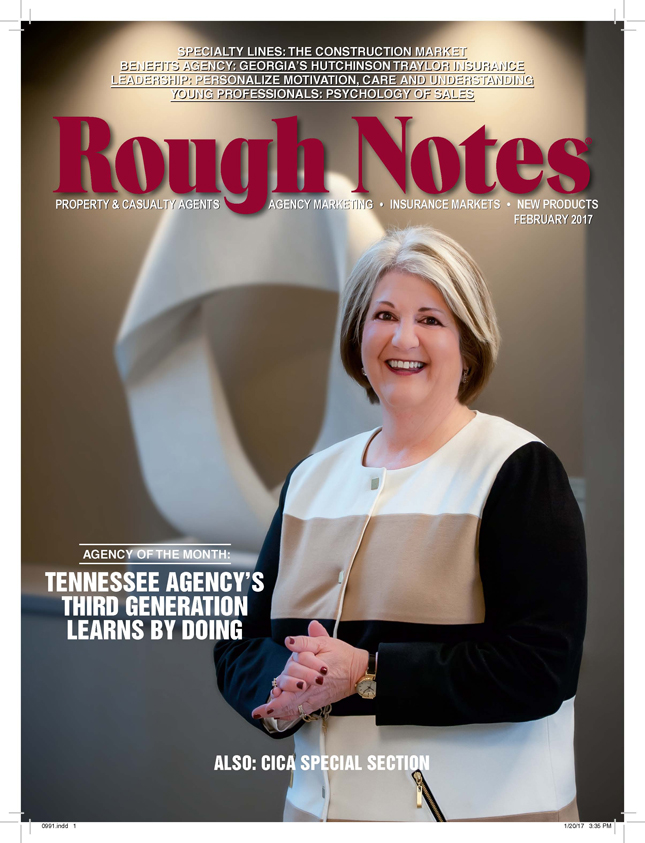 FEBRUARY
FEBRUARY
Wilkinson Insurance Agency
White House, Tennessee
In 1977, June Wilkinson left retail management to help at the family insurance agency. Six months after she came on board, her agency principal mom went home for lunch one day and never returned. “In what turned out to be my six-month ‘training’ period, I’d done nearly everything at the agency,” June says. During that time, the 21-year-old also earned her insurance license.
“When I joined the agency, we were primarily personal lines,” June recalls. “I recognized we were missing an important market, even if we just concentrated on cross-selling current clients, many of whom owned businesses.” She jumped in with both feet.
Early on, June—now June Taylor—saw possibilities in technology. “Our first computer was a dumb terminal, and I fondly remember our first fax machine.” In 1997, the agency went paperless; husband Gene came in and helped scan everything in. In 2008, the agency became a beta site for Applied EPIC.
Today, Millennial-age sons Ben and Andrew represent the agency’s fourth generation, letting June slow down a bit, start transferring ownership to them, and do what she loves best: sell. She recently created a new agency niche—the high-net-worth market—and is earning her CPRM designation.
Most striking about June, perhaps, is her willingness to help others. She credits much of her success to networking relationships she developed through the PIA, SIAA, AIMS Society, and Applied Client Network. “I want to do what I can to make the independent agency system even more successful,” she says. “I’m blessed with great friends in the business who have contributed to my success and, more important, reveled in it. In how many other businesses can you have that?”
“I truly believe in networking and sharing with other agents. I want to do what I can to make the independent agency system even more successful.”
—June Taylor, CPIA, CIC
Principal
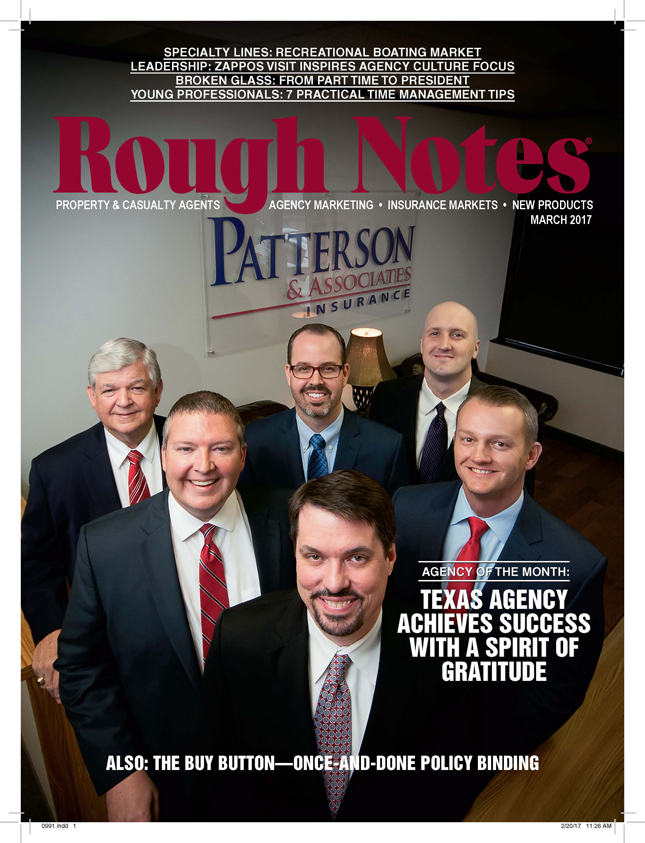 MARCH
MARCH
Patterson & Associates Insurance Agency, Inc.
Richardson, Texas
In the insurance world, as in life, many important lessons are learned the hard way. “Something that really brought home the importance of insurance to me was the recession in 2008,” says Ben Patterson, CIC, CRM, president of Patterson & Associates Insurance Agency, Inc., in the Dallas suburb of Richardson, Texas. Especially hard hit, he notes, were residential construction contractors. “One residential contractor came to us looking for a performance bond because the only work he could find to bid on was bonded commercial construction. Sadly, we were not active in the contractors surety market and were unable to help him, and he went out of business.”
Realizing the importance of insurance to the health of the economy, the agency, which had a strong book of personal lines business, began to establish relationships with contract surety markets. Principals also decided to pursue growth through diversification into a wide range of commercial lines markets so the agency would not be hurt by downturns that affected specific niche markets. The agency’s premium volume now stands at 65% commercial, 30% personal, and 5% benefits.
Growing a successful agency also means attracting talented young people and investing in their education and training, Patterson observes. “Project InVEST has been very helpful in developing talent and interest in insurance among young people in our area,” he says. “This has played a critical part in countering the activities of the banks, accounting firms, and other financial institutions that have been actively recruiting in our area.”
“We have the expectation that, when we hire someone, he or she will become a partner by building a book of business and meeting other criteria that include involvement with industry associations and giving back to the community.”
—Ben Patterson, CIC, CRM
President
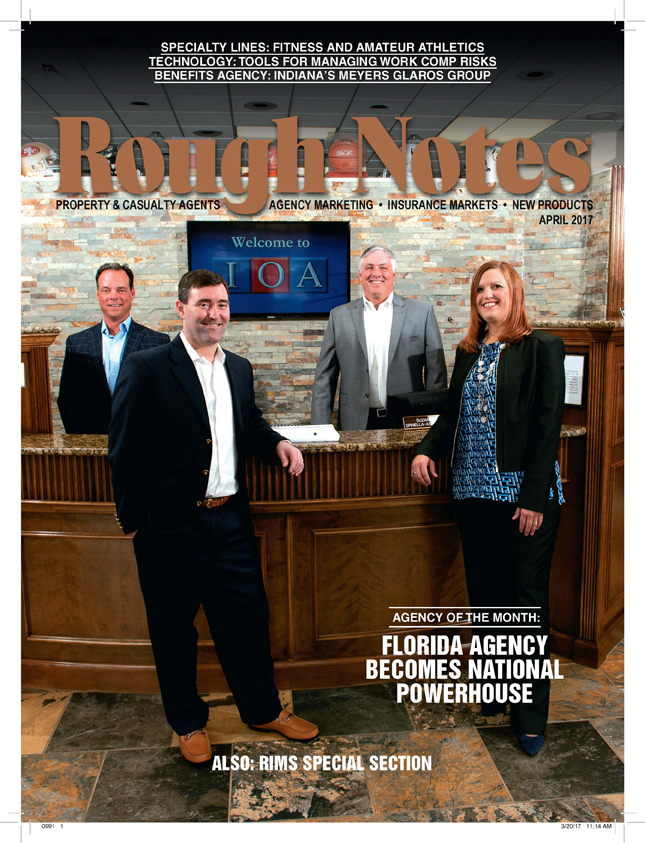 APRIL
APRIL
Insurance Office of America
Longwood, Florida
In 1988, Valli and John Ritenour started Insurance Office of America (IOA), building it as a place that would attract clients and employees, including top-performing agents. Jeff Lagos, agency president, explains, “They wanted to create an agency for agents, rather than for owners.” CEO Heath Ritenour, Valli and John’s son, adds, “To show how important retention is to us … we continue to pay producers for six years after they retire, based on retention.”
The agency works to help improve each client’s bottom line through risk management and mitigation. It interviews client management and employees to determine their complete risk profile, and then creates a client-specific strategic roadmap designed to improve risk handling and reduce risk transfer cost.
It refined the offering with its creation of RiskScore®, a program developed in partnership with clients and carriers. The process involves three steps: identify customer strengths and weaknesses; develop customer-specific solutions and implementations; and present insurance carriers with the customer’s RiskScore, to get better terms and conditions in the policy.
Heath explains, “RiskScore was developed around what our carriers look for in order for a particular business to be considered a best-in-class risk. We can show the client where they stand in relation to their peers in their industry, and what they need to become the best.”
“We’re not resting on our laurels,” Jeff says, referring to agency future-focused committees, including a client engagement team looking at “the agency’s long-term strategy in terms of emerging trends affecting the risk-transfer marketplace. This helps us continue to provide our clients and our insurance company partners with the most effective tools and strategies for risk management and risk mitigation.”
“We can show the client where they stand in relation to their peers in their industry, and what they need to be come the best.”
—Heath Ritenour
CEO
 MAY
MAY
Universal Business Insurance
Sandy, Utah
At Universal Business Insurance (UBI), working hard also means working smart. After attending a sales conference with Scott Addis, CPCU, founder of Beyond Insurance, the agency decided to join the Beyond Insurance Global Network (BIGN). The BIGN tools, says partner Jeff Shields, “really differentiate us in the marketplace. The consultative approach to risk management, combined with what we learn from IQRM™ questionnaires, helps us identify risk management strategies that focus on areas where the opportunities for improvement are greatest.”
“Work hard and have fun” might be the motto of UBI. “You have to have fun with the people you work with, to enjoy a mutual sense of accomplishment,” says Kevin Andrews, CRA, CIC, CRM, vice president of finance. “We’re not driven by money; that will come if you have fun and work together.”
Says Don Mayer, chairman and chief executive officer: “This is fun, not work. We’ve grown to become one of the top agencies in the state, with organic growth as a major contributor. We enjoyed double-digit growth in 2016 and are on track to do so again. We now have 48 people working here, and they’re all part of the family.”
Giving back to the community is in the DNA of the UBI family. In 2011 the agency established the UBI Cares Foundation, which focuses on a quarterly project supported by the agency. Employees also are given time off to work with their favorite charity.
“Everyone at the agency sees our clients as family members who deserve the best we can give them.”
—Jeff Shields
Partner
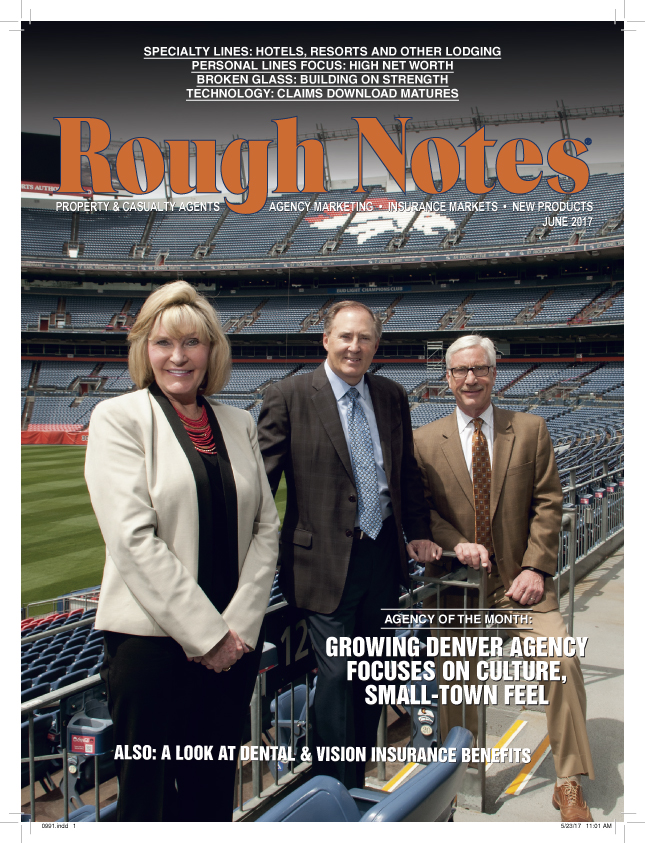 JUNE
JUNE
CCIG
Denver, Colorado
The leaders at CCIG see the organization as apyramid. “Our management team at the agency is at the bottom of that pyramid, with the client at the top,” says T. Scott Kennedy, president and COO.
Filling the pyramid’s other layers is the remainder of the team, who all assist clients. “It’s not uncommon for four or five people to be present at the point of sale,” Kennedy notes. “In addition to the producer, the team could include people from client service and claims.
“Because we include our claims advocates as part of the team, we can show clients what happens when we handle claims for them,” he adds. This approach has led to an impressive growth rate, which has averaged 15% annually for the past 10 years. “That means we double our revenues every five years,” Kennedy points out. “And I think we can continue that.”
As for hiring practices, the agency requires new hires to have a history of community involvement. “Our Community Outreach Committee plans events throughout the year to give employees good options to serve, volunteer, and help worthy charitable organizations,” says founder and CEO Brook Mahoney.
The group community involvement is an important aspect of the agency’s culture, which has led to an employee retention rate in the high 90s; the agency’s client retention rate is similar.
As important is its development of new talent. The agency’s Emerging Leadership Development Program looks to “identify individuals who can step into middle management roles,” Kennedy says. “We are always on the lookout for salespeople,” he adds. “And if we find someone who has the sales acumen and fits with our culture, we’ll always find room in our budget to bring them on board.”
“Our culture is our competitive advantage. We have focused on making CCIG a place that clients and employees enjoy.”
—T. Scott Kennedy, CIC, CRM
President and Chief Operating Officer
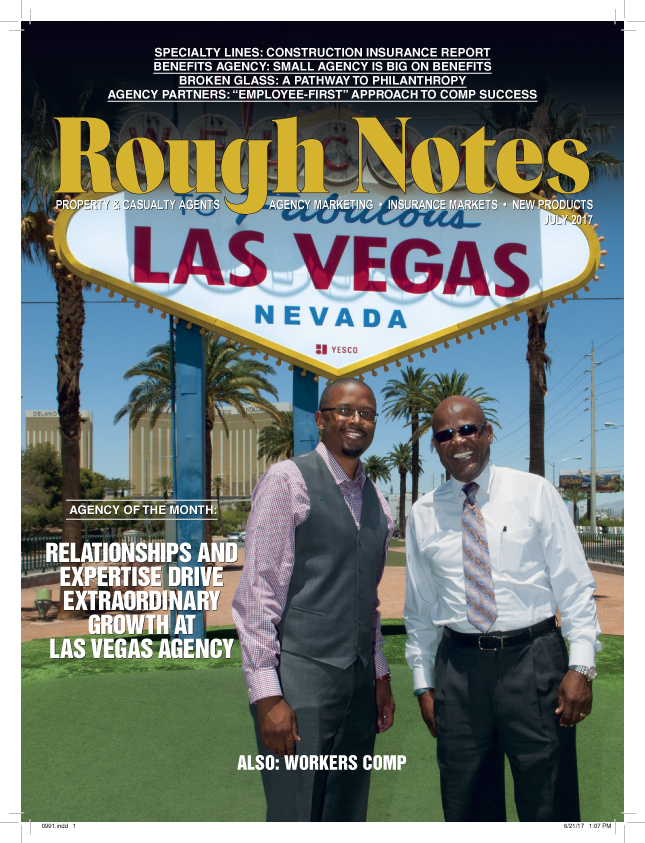 JULY
JULY
Branch Benefits Consultants
Las Vegas, Nevada
Going out on one’s own during the recent recession didn’t seem the best thing to do, especially in hard-hit Las Vegas. However, that’s exactly what forward-looking Quincy Branch did when his father decided to retire.
Ironically, Quincy didn’t enter the insurance industry by choice or by the proverbial “accident.” He was slyly enticed by his father, Aubrey, the founder of the firm, who persuaded Quincy to help him with the agency’s personal lines business accounting in order to finance his college education. Soon, Quincy was offered the opportunity to launch a life/health division, and he was hooked.
In 2011, Aubrey and his partner decided to retire and offered to incorporate their portion of Branch Benefits Consultants into Quincy’s division. And off he went. After only six years on his own, Quincy has parlayed what had been a two-person agency into a 14-employee business that realizes $2 million in revenue.
According to Quincy, his success is based on both what is old and what is new in the industry. The old: Relationships, both within the agency itself and in the larger community, are key to Quincy. The new: Taking advantage of new wrinkles on the horizon—such as healthcare and the ACA, with all of the ramifications.
In addition, because Las Vegas is a diverse community, Branch Benefits’ diverse staff is poised to serve its clients well.
Always looking to stay ahead of the curve, Quincy quotes as his mantra, “You can’t expect to be in business tomorrow and still use today’s methods.”
“We’re big on social media and education [and] have continued to provide regular seminars on insurance issues, as well as having a risk and business magazine.”
—Quincy Branch
President and CEO
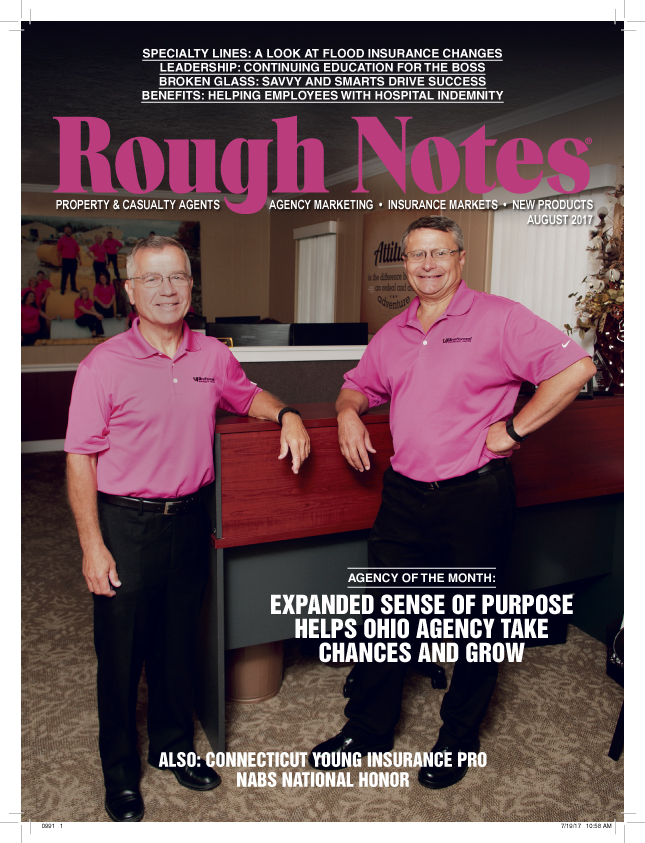 AUGUST
AUGUST
Preferred Insurance Center
Coldwater, Ohio
Looking for a way to celebrate its hundredth anniversary proved to be an unintended catalyst for initiating a cultural change within Preferred Insurance Center of Coldwater, Ohio. What better way to thank the community for 100 years of support than to create a “Year of Giving Back” by donating $10 to a local charity each time the agency submitted a quote?
Then, acting on the principle that success breeds success, Preferred decided to initiate its own fundraising effort for a further benefit to the community. “Flamingo Flocking” was the result, thanks to an agency intern. Large pink plastic flamingos would mysteriously appear in a client’s yard and remain there until the client paid a $20 “moving-fee donation,” after which the pink creatures would leave—only to appear in another yard. In addition, quite often a “victim” would let Preferred Insurance provide a quote to the tune of another $10 donation. By year’s end community charitable coffers had grown by $20,000.
These efforts changed the culture of Preferred Insurance Center and, according to partner Dan Muhlenkamp, “gave us a purpose beyond making money.” However, a side effect of the team’s enthusiasm for service has been extraordinary growth (six employees to 12), increased revenue (from $500,000 to$1 million last year), plus 41 referrals from one happy client.
In addition, joining the Keystone Insurers Group has provided Preferred the ability to offer more than just insurance; it now delivers a one-stop, complete complement of risk management and employee benefits services to its clients.
“We’ve developed a culture that is focused on helping people. And that message shows in the way we treat our team members, our clients, our insurance companies, and our community.”
—Roger RindlerPartner
 SEPTEMBER
SEPTEMBER
The Thompson Group
Parker City, Indiana
Life at an agency whose owners’ titles are The Insurance Ninja and The Insurance Queen has to be … well, different. And it is, thanks to the flower child funk that’s carefully nurtured by Anson Ross Thompson, CIC, CRM (The Ninja), and CEO Jenny Dils-Durr, CIC, CRM (The Queen).
The agency has its roots in a small personal lines agency established in 1973 by Thompson’s father. Thompson purchased the agency in 1996 and in 2012 was joined by Dils-Durr when the Thompson firm merged with the Indianapolis office of an agency that was founded by her father. Today the agency has two offices in the Denver area, and the partners spend alternate weeks in the two locations.
The agency is selective about the people with whom it does business. “We refuse to quote,” says Thompson. “Instead we rely on our audit process to develop a strong relationship with the clients who meet our criteria. About 30% of the time we find that there is not a fit.”
When the fit is right, clients become friends on a first-name basis. They can call the agency 24/7 and at first are surprised when they discover that the phone is always answered by a human being who can help rather than a robo-voice that instructs them to hit a series of buttons.
Thompson Group’s revenue now exceeds $2.3 million, and the agency operates in 26 states. Says Thompson: “We’re getting referrals from states where we don’t have an actual office because people like our difference.”
“We’re having a hell of a good time. And the best part is that we don’t work;we live. You couldn’t ask for anything better than that.”
—Anson Ross Thompson, CIC, CRM
Insurance Ninja
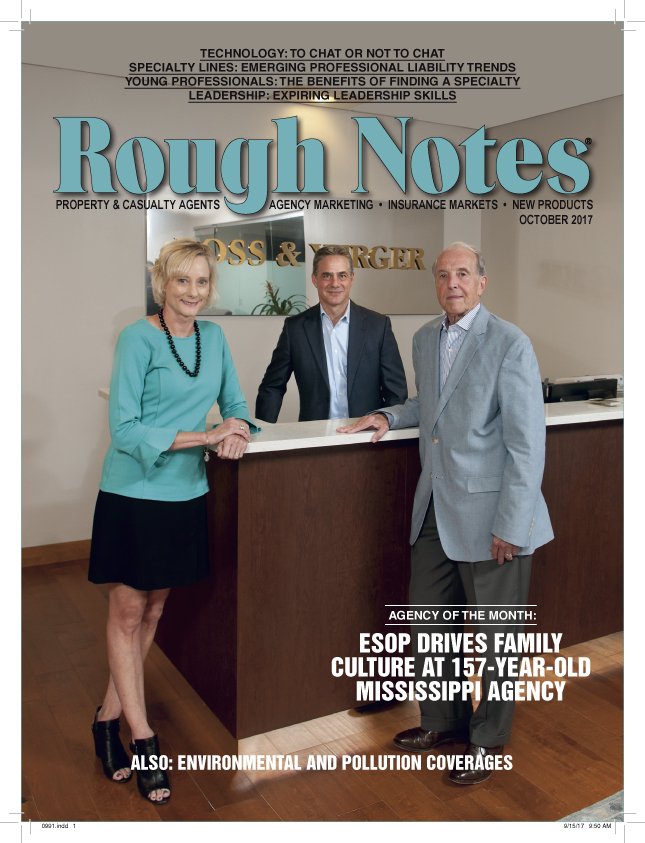 OCTOBER
OCTOBER
Ross & Yerger
Jackson, Mississippi
When a “family” agency has 116 members in four offices, it requires an effort to maintain the family atmosphere and a culture where people are always willing to help others succeed. Ross & Yerger traces its family roots to 1860. But in 2002, Wirt Yerger Jr., the last Yerger owner—wanting to perpetuate and for the agency to remain independent—sold it to its current owners.
“There was a noticeable shift taking place in our industry,” CEO and COO Dudley Wooley says. “Agencies were expected to provide risk management advice rather than just sell insurance, and that fit in perfectly with our goal to become closer to our clients.”
Amy Smith, CPCU, CIC, AU, executive vice president and commercial lines manager, says, “We decided that we needed to find a way to become true partners with our clients. Focusing on clients that were committed to risk management became our goal … .”
Revenues at the time of purchasing the agency were around $7 million, and the agency was projected to close 2017 at around $23 million, with commercial lines accounting for a little over 50% and employee benefits representing around 40%, its two largest contributors.
Just like any “family” business, Ross & Yerger is looking to its next generation for perpetuation. Its Future Partner Group program has a 70% success rate, “which is due in large part to the agency’s culture and getting to know the people who help them succeed,” says Scott Moak, executive vice president and head of the program, who also went through the program when he joined in 2006. “That’s really the lifeblood of our organization. We need future leaders if we want to perpetuate and remain independent.”
“We decided that we needed to find a way to become true partners with our clients. Focusing on clients that were committed to risk management became our goal … .”
—Amy Smith, CPCU, CIC, AU
Executive Vice President and Commercial Lines Manager
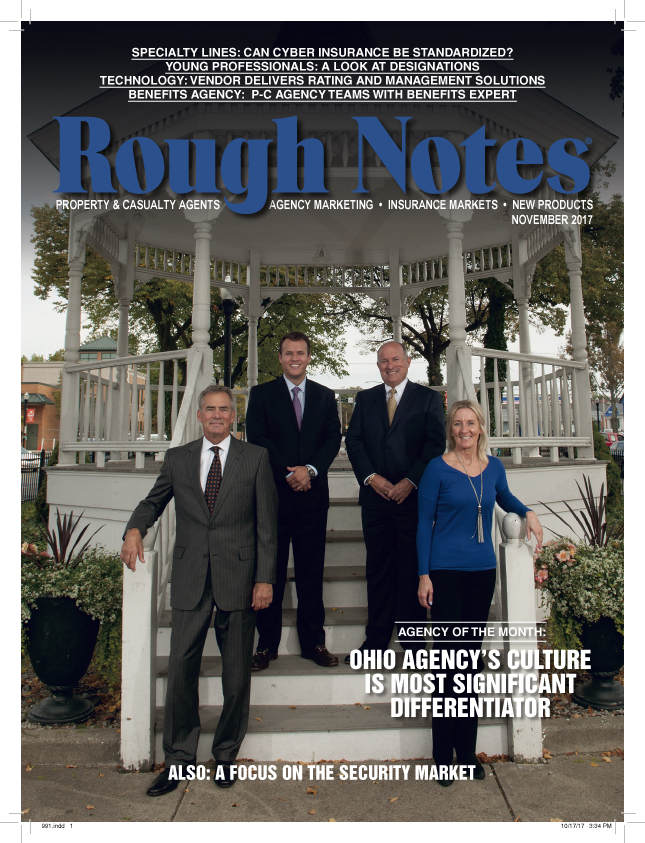 NOVEMBER
NOVEMBER
The O’Neill Group
Wadsworth, Ohio
Looking for a way to create a company culture that would best serve its clients in a quality way, The O’Neill Group searched the industry for strategic partners. Scott Addis’s Beyond Insurance fit the bill, particularly in its ability to move The O’Neill Group beyond a transactional culture. Risk Advisor Pat O’Neill, son of President and CEO Patrick, says that “we were quoting insurance and hoping to land some accounts … But now we’ve become outsourced risk managers for our clients and have such a different relationship.”
Executive Vice President Tom Van Auker agrees: “We [adopted] the process where we offered our risk management experience rather than insurance. We became partners with our clients, helping them improve their bottom line by reducing their overall cost of risk through mitigation and elimination of risks.” By remaining constantly in touch with their clients, agency members prevent a competitor from entering the picture, “as long as we do our job well,” Van Auker points out.
An added source of inspiration for O’Neill’s cultural revolution was David Friedman’s Fundamentally Different. Drawing upon its emphasis on the basic characteristics of a vital culture, the agency created “The O’Neill Way,” which consists of 30 fundamentals, each one of which incorporates a positive statement such as “Do what’s best for the client,” “Be positive,” “Work on yourself,” and, in all cases, “Keep things fun.” A single fundamental is addressed at weekly meetings or via an email that presents a scenario and four possible responses from which team members can choose.
“[W]e were quoting insurance and hoping to land some accounts … But now we’ve become outsourced risk managers for our clients and have such a different relationship. We go beyond insurance to protect their assets and financial resources.”
—Pat O’Neill, CIC, CRM, CWCA
Risk Advisor
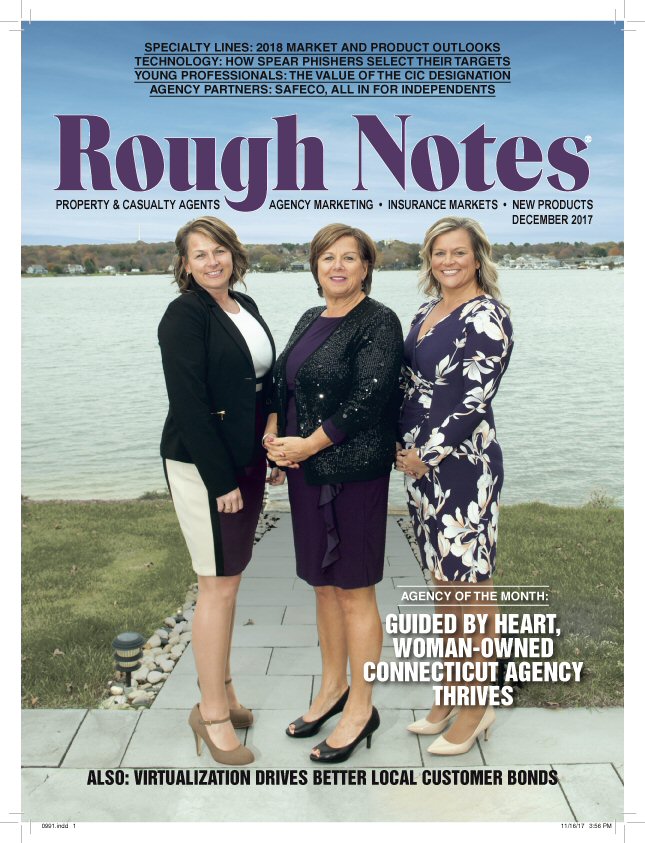 DECEMBER
DECEMBER
SAVA Insurance
Waterford, Connecticut
“We’re guided by heart,” says Donna Yother, president and owner of SAVA Insurance. “We are proud to lead and think with our hearts first. We take time to truly listen and make the best decisions for our clients based on their unique needs.”
Yother purchased the agency in 1998 and bought out her partner in 2014. Her first “new owner” change was to consolidate the handful of offices into one; she also decided the agency should shift from writing non-standard business to focus on preferred accounts.
“Today, most of our business is preferred,” she says. “We write about three policies per account, and we’ve been growing by nearly 10% a year.”
SAVA also focuses on niche marketing and “works with our carriers to provide competitive rates and coverage options for our clients,” says Diana Yother Buscetto, vice president and commercial lines business development manager. Principal niches include nonprofits, contractors, women-owned businesses and in-home healthcare.
The agency is also visible in its community, performing frequent service. “It’s not unusual to see the SAVA team attending community events two or three times a week,” Donna says.
“Most of our business is in the community,” says Debbie Yother Kane, vice president and personal lines business development manager. “This is our way of giving back, of thanking the community for supporting us. Along the way, we’ve developed strong relationships with our clients, who are happy to refer their clients because they know that we provide the right advice and excellent service. Our referral program produces between 400 and 500 referrals every year.”
“We’re definitely out in the community. We’ve been supporting local charities for more than 20 years, and we’re not just a name on a check.”
—Debbie Yother Kane
Vice President and Personal Lines Business Development Manager

